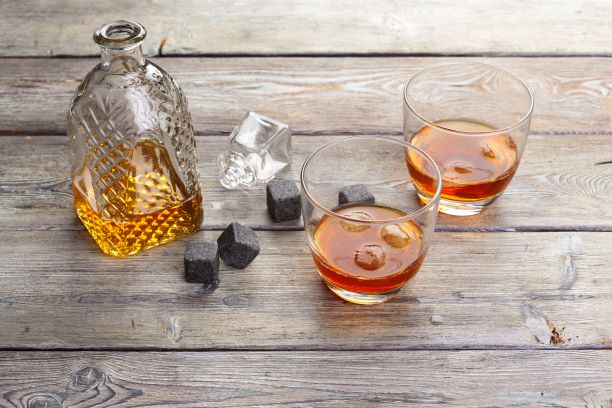Last Updated on: 11th July 2025, 06:35 am
Excessive alcohol consumption damages tooth enamel and dries out your mouth, which increases the risk of cavities and gum disease. It also causes bad breath, tooth erosion, and stains. Additionally, it raises the risk of serious oral health problems like necrotizing periodontal disease and oral cancer, especially when combined with tobacco use.
Whether you’re at a gathering, a party, or just having fun, drinking alcohol is part of most people’s lives. Some drink for enjoyment, while others may depend on it.
But did you know that alcohol, as people often say, isn’t just bad for your liver? It can also seriously affect your oral health if you don’t take care of your teeth while drinking.
In this article, we’ll explore the effects of alcohol on the teeth and learn how to protect them to keep your smile healthy and strong.
Table of Contents
ToggleHow does alcohol affect your mouth overall?
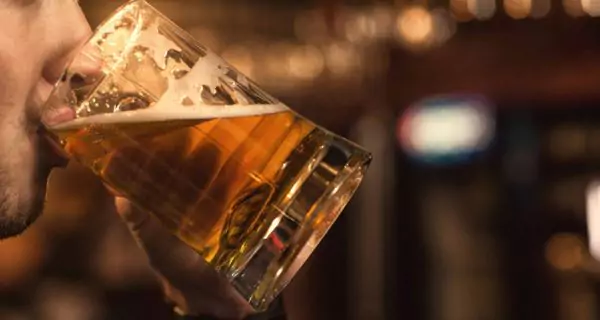
Alcohol affects almost every part of your mouth. Here’s how:
- it weakens enamel, the protective outer layer of your teeth.
- it dries out your mouth, reducing saliva that keeps your mouth clean.
- it harms your gums, raising the risk of infections.
- it causes bad breath and stains your teeth.
- it increases your risk of oral cancer over time.
What happens to the bacteria in your mouth when you drink?
Your mouth has millions of bacteria that usually live in balance to protect you. This is called your oral microbiome.
But when you drink alcohol, this balance gets disrupted, and several things happen:
- bad bacteria increase: types like Prevotella and Fusobacterium grow, causing inflammation and infections.
- good bacteria decrease: protective bacteria such as Lactobacillales decline, weakening your natural defenses.
- bacterial variety drops: with fewer types of bacteria, your mouth becomes more vulnerable to infections.
This imbalance makes it easier for infections, cavities, and gum diseases to develop. It can also affect your general health, because harmful bacteria can enter your bloodstream and cause inflammation in other organs.
What gum problems can alcohol cause?
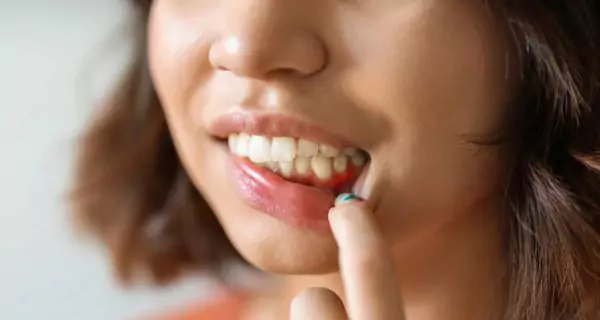
Drinking alcohol increases your risk of gum diseases, such as:
- gingivitis: gums become red, swollen, and bleed easily.
- periodontitis: a deeper infection that damages the bone holding your teeth, leading to tooth loss if untreated.
- necrotizing periodontitis: a severe disease where gum tissue dies, usually in people with poor nutrition or weak immunity.
The World Health Organization (WHO) explains that alcohol weakens your immune system and reduces blood flow to your gums, making infections easier to develop and harder to heal.
How are gum diseases treated?
Your dentist may recommend:
- professional cleaning to remove plaque and tartar.
- deep cleaning (scaling and root planing) to clean under the gums.
- antibiotics for severe infections.
- better home care, including brushing twice daily, flossing, and using alcohol-free mouthwash.
How does alcohol cause cavities?
Alcohol leads to cavities in three ways:
- high acidity: drinks like wine, champagne, and cocktails erode enamel.
- sugars in drinks: feed bacteria that produce acids, leading to decay.
- dry mouth: alcohol reduces saliva, meaning acids stay longer on your teeth, causing erosion and cavities.
People with alcohol dependence have three times higher risk of permanent tooth loss.
How are cavities treated?
Your dentist may suggest:
- fillings: for small cavities.
- crowns or veneers: for larger damage or weakened teeth.
- fluoride treatments: to strengthen weakened enamel.
- remineralizing toothpaste: to rebuild enamel and reduce sensitivity.
Why does alcohol cause bad breath?
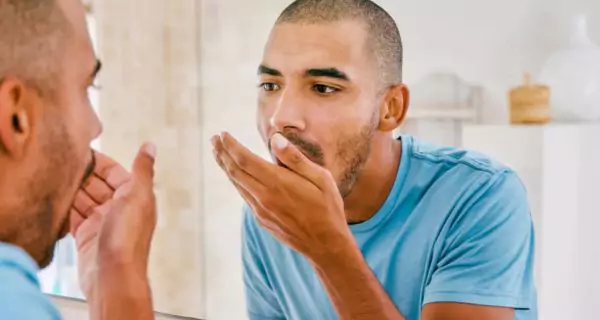
Alcohol can cause bad breath because:
- your body turns it into acetic acid, which smells like vinegar.
- it dries out your mouth, reducing saliva that cleans away bacteria and food particles.
- it can worsen acid reflux, bringing stomach acid into your mouth and making your breath smell worse.
How is bad breath treated?
To reduce bad breath:
- brush your teeth and tongue twice a day to remove bacteria that cause odor.
- drink plenty of water throughout the day, especially when drinking alcohol, to keep your mouth hydrated.
- use alcohol-free mouthwash to avoid further dryness and keep your breath fresh.
- reduce your alcohol intake: the less you drink, the fresher your breath will be.
Why does alcohol stain teeth?
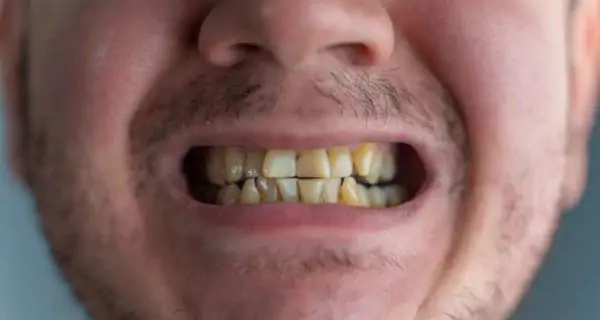
Not all alcoholic drinks stain your teeth, but some are more likely to cause discoloration:
- Red wine contains strong pigments (chromogens) that stick to enamel, causing yellow or brown stains.
- Dark beers can also stain teeth due to the dark barley and malts they contain.
- Acidic drinks wear down enamel, making it easier for stains to stick.
Holding drinks in your mouth before swallowing increases contact with teeth, raising the risk of staining and enamel erosion.
How are stains treated?
Your dentist can help with:
- professional cleaning for surface stains.
- whitening treatments for deeper stains.
- fluoride treatments or sealants to protect enamel.
- dental veneers for severe discoloration.
Can alcohol increase cancer risk?
Alcohol is classified as a Group 1 carcinogen by the World Health Organization (WHO); in fact, drinking alcohol increases the risk of developing cancers in the mouth, throat, and esophagus.
Even moderate drinking can raise this risk, but it becomes much higher if you also smoke. This is because alcohol makes it easier for harmful chemicals in tobacco to enter the cells in your mouth and throat, multiplying their damage.
About 4% of all new cancer cases are linked to alcohol consumption around the world. This includes oral cancer, which can affect your lips, tongue, cheeks, gums, and the roof or floor of your mouth.
How is oral cancer diagnosed and treated?
Early diagnosis is key. Dentists and doctors look for signs such as:
- sores in the mouth that don’t heal
- lumps, thick areas, or rough spots
- white or red patches inside the mouth
- pain, numbness, or changes in your bite
If your dentist notices anything suspicious during a regular check-up, they will refer you to a specialist for further testing, which may include a biopsy to confirm the diagnosis.
Treatment options depend on how advanced the cancer is and may include:
- surgery to remove the cancerous tissue
- radiation therapy to destroy cancer cells
- chemotherapy for advanced or spread cancers
The earlier it’s detected, the higher the chances of successful treatment and recovery.
How can you protect your teeth if you drink alcohol?
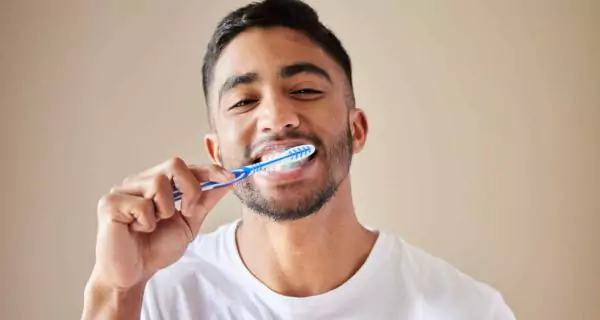
The ideal choice is to stop drinking alcohol altogether, but we know that’s not easy, and not everyone wants to do it. So, if you drink alcohol, here are simple ways to keep your teeth healthy.
How can you maintain excellent oral hygiene?
Good oral hygiene is your best protection against the damage alcohol can cause. Make sure to:
- brush your teeth and tongue twice a day to remove bacteria and keep your breath fresh.
- floss once a day to clean between your teeth and prevent plaque build-up.
- use an alcohol-free mouthwash to keep your mouth clean without drying it out.
- wait at least 30 minutes before brushing after drinking acidic drinks to avoid harming your enamel.
What healthy drinking and eating habits should you follow?
Your choices while drinking can protect your teeth:
- drink in moderation: the CDC recommends up to 1 drink per day for women and up to 2 for men. Less is always better for your teeth and overall health.
- choose drinks wisely: light beer is less acidic than wine or cocktails and gentler on enamel.
- use a straw: it reduces direct contact between alcohol and your teeth.
- drink plenty of water: sp water between alcoholic drinks to wash away acids and keep your mouth hydrated.
- eat calcium-rich foods: snacks like cheese or yogurt strengthen your enamel while you drink.
- chew sugar-free gum: it increases saliva flow, which helps protect your teeth naturally.
How often should you visit the dentist?
Regular dental care is essential if you drink alcohol. So, visit your dentist every 6 months for professional cleanings and check-ups. This helps catch early signs of damage and keeps your teeth and gums healthy.
What happens if you stop drinking alcohol?
Stopping or reducing alcohol has big benefits:
- more saliva production, which protects teeth from decay.
- healthier gums, with less bleeding and swelling.
- lower cancer risk, especially if you quit smoking too.
- better overall health, including your liver, blood sugar, and nutrition.
The effects of alcohol on the teeth go far beyond stains or bad breath. Alcohol can weaken your enamel, damage your gums, cause cavities, and even increase your risk of oral cancer.
By drinking less, keeping good brushing and flossing habits, and visiting your dentist regularly, you can protect your smile and your overall health.
Don’t wait until pain starts. Take care of your teeth today so you can enjoy a healthy, confident smile for many years to come.
Frequently Asked Questions (FAQ)
Beer is usually less acidic than wine, especially light beer, so it causes less erosion. However, dark beers can stain your teeth, and any alcohol dries out your mouth, increasing your risk of cavities and gum problems. Alcohol-free beer removes the alcohol effect, but some types are still acidic or contain sugars that can damage enamel over time. Drinking water after and keeping good oral hygiene helps reduce this risk. Yes. Excessive alcohol consumption can slow down healing after implant surgery and may increase the risk of implant failure. It can also cause gum problems around the implant, affecting its long-term success. Yes. Using a straw reduces the contact alcohol has with your teeth, especially front teeth, lowering the risk of erosion and staining. However, it doesn’t completely eliminate the damage. Yes. Alcohol dries out your mouth and changes the balance of bacteria, which can lead to a bad taste along with bad breath. Acid reflux caused by alcohol can also leave an unpleasant taste.
Why do my teeth hurt after drinking alcohol?
Your teeth may hurt because alcohol erodes enamel, exposing the sensitive inner layers of your teeth. Acidic drinks can also trigger sensitivity, especially if enamel is already worn down.
Why does my mouth feel dry after drinking alcohol?
Alcohol is a diuretic, meaning it dehydrates your body and reduces saliva production, leaving your mouth dry and more vulnerable to bacteria and cavities.
How long should I wait to brush my teeth after drinking alcohol?
Wait at least 30 minutes after drinking acidic drinks like wine, beer, or cocktails before brushing your teeth. This gives your enamel time to harden and prevents erosion.
References
1. Carey, E. (2018, September 29). How alcohol affects your dental health. Healthline. https://www.healthline.com/health/dental-and-oral-health/what-does-alcohol-do-to-your-teeth
2. Colaco, A. S., Mayya, A., Shetty, P., & Mayya, S. S. (2024). Dental impact on daily life and oral health in alcohol use disorder patients. Clinical Epidemiology and Global Health, 101836. https://doi.org/10.1016/j.cegh.2024.101836
3. Mayo Clinic. (2023, December 19). Dry mouth – symptoms and causes. Mayo Clinic. https://www.mayoclinic.org/diseases-conditions/dry-mouth/symptoms-causes/syc-20356048
4. Priyanka, K., Sudhir, K. M., Reddy, V. C. S., Kumar, R. K., & Srinivasulu, G. (2017). Impact of alcohol dependency on oral health: a cross-sectional comparative study. Journal of Clinical and Diagnostic Research. https://doi.org/10.7860/jcdr/2017/26380.10058
5. World Health Organization. (2024, June 28). Alcohol. WHO. https://www.who.int/es/news-room/fact-sheets/detail/alcohol



